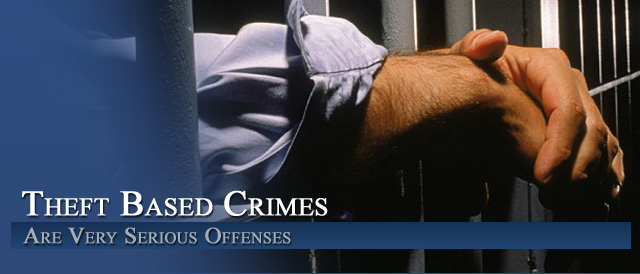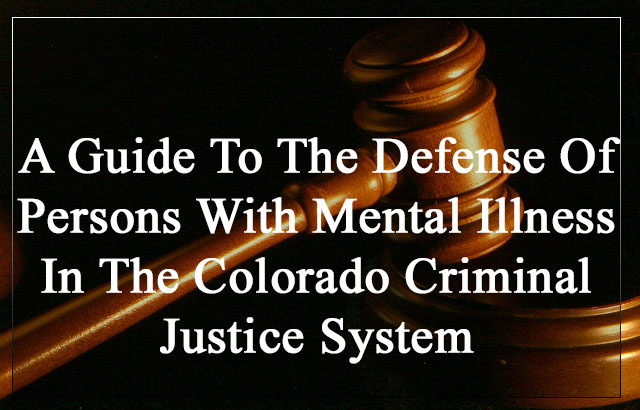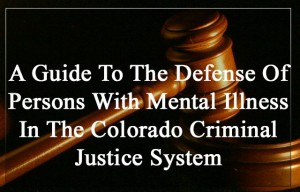




A Guide To The Defense Of Persons With Mental Illness In The Colorado Criminal Justice System
By H. Michael Steinberg Colorado Theft Crimes Criminal Defense Lawyer – Attorney
A Guide To The Defense Of Persons With Mental Illness In The Colorado Criminal Justice System – Representation of Colorado Defendants with mental health needs is both complex and difficult. This guide examines the many issues that surround the successful representation in Colorado criminal court when the accused suffers from mental health issues.
The Ignorance Of The Colorado Criminal Justice System To The Needs Of Mentally Ill Accused Of Crime
Almost all criminal justice systems, including Colorado’s, are lacking when it comes to the special needs of Defendants with mental illness. These cases present a special challenge to Prosecutors, Defense attorneys, and the Judge’s who are faced with the difficulties of adjudicating – including the application of wholly inadequate sentencing in cases where a Defendant’s mental illness plays a major role.
While Colorado has partially addressed and answered this problem with Mental Health Courts in some jurisdictions, it is often the case that criminal defense lawyers are not familiar with the tactics – strategies – mechanisms – procedures, and laws that apply in these cases.
Mental illness substantially impairs a person’s thought, perception of reality, emotional process, or judgment; and it can also grossly impair their behavior.
Mental disorders are much more common than you might believe. One in four Americans has some type of mental disorder in any given year. These same individuals – (about 8% and 15%) have a “co-occurring” substance use disorders and that percentage increases statistically when the question focuses on the mentally ill in the criminal justice system.
At any one moment in time about 50-60% of the jail and prison population in our country has a significant mental illness (schizophrenia, bipolar disorder, or major depression).
Some Of The Most Common Mental Health Disorders In The Colorado Criminal Justice System
Schizophrenia
Schizophrenia impairs a person’s ability to think, make judgments, respond emotionally, remember, communicate, interpret reality, and/or behave appropriately. Schizophrenia grossly interferes with a Defendant’s ability capacity to comply with Colorado criminal laws. Schizophrenia includes poor reasoning, disconnected and confusing language, hallucinations, delusions, and deterioration of appearance and personal hygiene.
Bipolar Disorder or Manic-Depressive Illness
Bipolar disorder or manic-depressive illness is impacts a person’s moods. Bipolar Disorder or Manic-Depressive Illness manifests itself through alternating between two extremes – depression and mania (exaggerated excitement). The illness often manifests itself through delusions, irritability, rapid speech, and increased activity.
Major Depressive Disorder
Major Depressive Disorder manifests itself in the symptoms such as the complete loss of interest in daily activities. Major Depressive Disorder disrupts tasks such as sleeping, lack of concentration and may result in feelings of worthlessness, guilt, and hopelessness.
Lack Of Knowledge About Mental Illness Means Dangerous Plea Agreements “Just To Get Out Of Jail”
All too often a Defendant’s mental illness is not fully recognized and understood by the stakeholders in the criminal courtrooms of Colorado. In these situations a Defendant’s desire to get out of jail can quickly result in a plea bargain – and that plea of guilty to an alleged offense may be a situation where a plea bargain should have never been struck.
A Defendant’s mental incapacity clearly reduces that Defendant’s ability to:
1. understand what is happening to him or her or
2. to participate in his or her own defense,
Due process means basic fairness to all. For the mentally ill a lack of understanding of the “system” often results in harsher sentences, longer pre-trial stays in jail, and, following a plea bargain, frequent revocations of probation or of parole.
Some Basic Foundational Information About Representing The Accused Who Suffers From Mental Illness
First: You Must Understand Mental Illness and Intellectual and Developmental Disabilities Are Different
The ignorance of the public to the above distinction cannot be overstated. While developmental disabilities are permanent conditions that are characterized by significantly below average intelligence accompanied by significant limitations in certain skill areas – mental illness most often involves disturbances in thought processes and emotions and may be temporary, cyclical, or episodic.
The mentally ill do not usually have intellectual deficits – many have high or even very high intelligence. While mental illness and developmental disabilities sometimes occur at the same time – it is rare.
Second – To Lawyers – Representing The Mentally Ill Requires Time – If You Don’t Have It – Refer The Case To Someone Who Does
The ethical obligation to “zealously” represent a client means the individual client. If you have the opportunity to refer a difficult case involving many mental health issues to another lawyer (who has the time to file the appropriate motions based on the impact of that client’s mental illness) the criminal defense lawyer should admit that truth and refer the case to another lawyer who has both the time and experience.
Third – To Lawyers – Raise Your Client’s Competency Even If That Client Objects If It Is In THEIR Best Interest
If the Colorado criminal defense lawyer recognizes there is an issue of a client’s competency – he or she needs to request a mental health evaluation.
A client must have the capacity to make informed decisions about the most fundamental issues of a criminal case. Most important among them is the decision of whether to enter into a plea bargain agreement or proceed to trial. When the client is possibly incompetent to make these critical decisions – they cannot be allowed to accept a plea bargain, or to make the decision to take the case to trial or to testify at that trial.
In this situation the ONLY OPTION is to request a Colorado competency evaluation.
Fourth – A Defendant With Mental Illness Can – And Most Often Does – Have The “Legal” Capacity To Make The Critical Decisions In A Colorado Criminal Case
Competency to stand trial is a very low bar. The mental capability to “stand trial” is distinct from mental illness. A Court may find a Defendant who is competent to stand trial but may also have a serious mental illness. If a client is mentally ill, even where there is no issue of competency, the Colorado criminal lawyer should explore the Defendant’s mental health issues with the District Attorney and the Court.
Here is gets confusing – if a Defendant is competent the law mandates that he or she must be allowed to make the final decision about how to proceed with the case and that includes the decision to explore mental health issues – especially whether that Defendant will agree to a condition of the sentence (usually a condition of probation) of whether treatment should be part of the plea agreement.
Here is a more comprehensive list of final decision-making authority of a Defendant in a Colorado criminal case:
1. What plea to enter.
2. Whether to waive a jury trial.
3. Whether to testify in his or her own behalf.
4. Whether to appeal.
5. Whether to represent himself or herself. (“to go pro se”)
Compare this to so called “Captain of the Ship” decisions made solely by the criminal defense lawyer:
1. Which witnesses to call.
2. Whether and how to conduct cross-examination.
3. What trial motions to make.
4. All strategic and tactical decisions.
Fifth – The Failure To Seek The Assistance Of An Expert In Mental Health May Be Malpractice
Known generally as “ineffective assistance of counsel“, a Colorado criminal defense lawyer should seek the assistance of a qualified mental health professional to help that lawyer and client make the key decisions in a complex in a serious criminal case. The failure to do so may impact that Defendant’s Sixth Amendment right to the effective assistance of counsel.
Other Impacts Of A Defendant With A Mental Illness In The Colorado Criminal Justice System
Mental illness can impact dozens of issues in their criminal case.
These include:
1. The voluntariness of the statements of the mentally ill to law enforcement. As unbelievable as it may sound, if incriminating statements were the product of mental illness or intellectual and developmental disabilities, they may still be admissible if the police did not coerce those statements. The lawyer is somehow left with the mostly unsuccessful argument that the statements were not the product of a sound mind. (See Colorado vs. Connelly)
2. The mentally ill Defendant may not understand the rights explained to him or her, (such as the Miranda warnings).
3. The mentally ill Defendants’ statements may not be reliable.
3. The mentally ill Defendant may not have the capacity to recall events, to make decisions, to reason, to exercise judgment, volition, or comprehension.
4. The mentally ill Defendant may not have the ability to understand cause and consequence – to learn from prior mistakes.
5. The mentally ill Defendant may not have the ability to waive rights in a knowing, intelligent, and voluntary manner, including the right to counsel, right to be present, right to trial and appeal, and right to testify; and
6. The mentally ill Defendant may not have the ability to meaningfully participate in trial preparation or assist in his or her defense at trial.
Understanding Some Of The Key Issues In Handling Cases Where The Defendant Has A Mental Illness
As noted above, one of the key challenges to representing individuals with mental conditions is persuading the authorities to have compassion, without justifying or excusing the crime. This is a matter of educating the authorities of the significant impairments and disabilities that limit this Defendant.
If a Defendant lacks the ability to reason or to exercise sound judgment – this must be brought to the attention of all involved as soon as possible. To do this, documenting a mentally ill Defendant’s prior history of mental impairment is critically important. This may also require the use of an updated professional mental health evaluation.
Mental-state defenses are based on an understanding of the neuro-biology of brain diseases. It is important for the Colorado criminal defense lawyer to understand that mental illness is a medical illness, profoundly experienced by those who suffer from the illness. Mental illness can be diagnosed, treated, and sometimes cured.
Presenting Mitigating Factors As A Means Of Obtaining The Best Result In A Colorado Criminal Case
The idea of presenting mental illness as “mitigation” to the prosecutor, while not a defense to prosecution and not an excuse for committing a crime, it IS to intended to educate the authorities of a disability or condition that invites compassion on the part of those authorities.
When mental illness plays a role in the charged offense, it is important to first seek the dismissal of the case. There are times when a District Attorney may exercise their discretion not to pursue a case where the Defendant obviously suffers from a mental illness that affected the Defendant’s judgment at the time of the alleged offense.
Understanding The Impact Of Any Form Of Incarceration Is Particularly Problematic To People With Mental Illness
Incarceration, according to the mental health experts, is very damaging to the stability, mental health, and physical health of people with mental illness. By placing mentally ill persons in single cells, isolation, or “lock down” a debilitating condition such as schizophrenia, depression, and anxiety is made much worse. There is no compassion in jail or prison. Those with mental illness are also much more likely to be victimized by other inmates or jail staff. They are at high risk for suicide. They may get inadequate, if any, medication and treatment while in jail.
The “Revolving Door” Of The Plea Agreement – Probation – Plea Bargains And The Sentencing Of The Mentally Ill In Colorado Criminal Cases
Mental illness makes very difficult the successful completion of probation. The “revolving door” of plea bargain – probation and then probation violation is not only costly to the State the impact on the individual and their families is incalculable.
Probation can be “setting up” the mentally ill Defendant for failure. A person who is mentally ill may not be able to hold down full-time employment, pay probation and other court fees, track appointments with the probation officer, perform public service hours, or complete education or treatment programs.
In a probation revocation proceeding for a violation of probation, the Colorado criminal defense lawyer must educate the Court educate about the Defendant’s mental illness and the kind of compassionate treatment options that could be made part of the conditions of his or her new probation.
This kind of information should take the form of establishing:
a) that the Defendant’s mental illness is chronic, and/or
b) that the Defendant’s ability to function will continue to deteriorate without proper treatment.
Conditions Of The Plea Agreement – Paying Attention To The Kind Of Conditions Of Probation For The Mentally Ill Defendant
The sentencing of the mentally ill should not be left to routine probation. Persons placed on probation or who receive deferred judgement and sentence agreements should have as conditions of their probationary sentences orders to:
(1) stay on their medications;
(2) not consume illegal drugs or alcohol:
(3) seek the care of qualified mental health professionals; and
(4) utilize all resources who may assist in obtaining housing, transportation, etc..
The Criminal Defense Lawyer With A Mentally Ill Client – The Steps To Take
To determine the mental illness of a client – the Colorado criminal defense lawyer should:
1. Interview the Defendant/client as soon as possible.
2. Determine the facts of the case.
3. Complete a history of any treated for any type of mental illness.
4. Review all mental health and/or medical records if they are available.
5. Talk to the Defendant’s family.
6. Thoroughly interview any and all witnesses to the alleged crime.
7. Interview, especially the complaining witness(es) and seek their input as to a dismissal of the charges in favor of mental health treatment.
8. Speak to the Investigating / Arresting Officer to determine if that officer will join in dismissing the case in favor of mental health treatment.
The Dual Diagnosis Situation – The Mentally Ill With Co-occurring Substance Abuse Problems.
It is very common for Defendant’s with mental illness to also have addictions to drugs and/or alcohol. This is known generally as using these drugs to “self-medicate” the symptoms of their mental illness. While a lawyer cannot force the Defendant into any form of treatment, it is an obligation of the criminal defense lawyer to fully communicate to the Defendant and to their families – all aspects of the plea bargain agreement.
If that is done, sometimes using the assistance of a mental health expert, then it is the client’s decision as to how they want to proceed. Any decision must be made after being fully informed of all of that Defendant’s options.
A Guide To The Defense Of Persons With Mental Illness In The Colorado Criminal Justice System
If you found any of the information I have provided on this web page article helpful please click my Plus+1 or the Share buttons for Twitter and Facebook below so that others may also find it.
The reader is admonished that Colorado criminal law, like criminal law in every state and at the Federal level, changes constantly. The article appearing above was accurate at the time it was drafted but it cannot account for changes occurring after it was uploaded.
If, after reading this article, you have questions about your case and would like to consider retaining our law firm, we invite you to contact us at the Steinberg Colorado Criminal Defense Law Firm – 303-627-7777.
Never stop fighting – never stop believing in yourself and your right to due process of law. You will not be alone in court, H. Michael will be at your side every step of the way – advocating for justice and the best possible result in your case.
 ABOUT THE AUTHOR: H. Michael Steinberg – Email The Author at [email protected] – A Denver Colorado Criminal Defense Lawyer – or call his office at 303-627-7777 during business hours – or call his cell if you cannot wait and need his immediate assistance – 720-220-2277. Attorney H. Michael Steinberg is passionate about criminal defense. His extensive knowledge and experience of Colorado Criminal Law gives him the edge you need to properly handle your case.
ABOUT THE AUTHOR: H. Michael Steinberg – Email The Author at [email protected] – A Denver Colorado Criminal Defense Lawyer – or call his office at 303-627-7777 during business hours – or call his cell if you cannot wait and need his immediate assistance – 720-220-2277. Attorney H. Michael Steinberg is passionate about criminal defense. His extensive knowledge and experience of Colorado Criminal Law gives him the edge you need to properly handle your case.
“A good criminal defense lawyer is someone who devotes themselves to their client’s case from beginning to end, always realizing that this case is the most important thing in that client’s life.”
You should be careful to make a responsible choice in selecting a Colorado Criminal Defense Lawyer – and we encourage you to “vet” our firm. Over the last 40 plus years – by focusing ONLY on Colorado criminal law – H. Michael has had the necessary time to commit to the task of constantly updating himself on nearly every area of criminal law, to include Colorado criminal law and procedure and trial and courtroom practice. H. Michael works hard to get his clients the best possible results in and out of the courtroom. He has written, and continues to write, extensively on Colorado criminal law and he hopes this article helps you in some small way – A Guide To The Defense Of Persons With Mental Illness In The Colorado Criminal Justice System.

Other Articles of Interest:
- Colorado Criminal Law – Understanding Kleptomania – The Compulsion To Steal
- A Guide To The Crimes Of Theft Under Colorado Law
- Concealment of Goods 18-4-406 and Questioning of Persons Suspected of Theft 18-4-407
- Colorado Criminal Law – Understanding The Power Of District Attorneys and Prosecutors To Bring Charges – Pre-Filing Representation
- Colorado At Risk Sentencing Enhancers – When The Alleged Victim Has Special Victim Status Under Colorado Criminal Law













